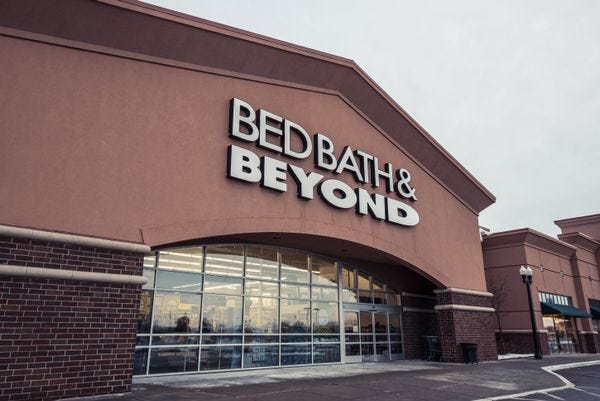Can We Blame Stock Buybacks For Our Now Useless Pile Of Bed Bath & Beyond 20% Off Coupons?
Probably!
Bed Bath & Beyond is going out of business, which is unfortunate for those of us who are not totally sure where we are supposed to buy luxury pillows now, as well as for the thousands of people they laid off without severance. Okay, especially for the thousands of people they laid off without severance. Particularly those in New Jersey who were laid off without severance mere days before a law mandating severance will go into effect. Under the new law, the company would have had to pay workers one week of severance for every year they were employed, but now they get nothing.

Lose Willy Wonka GIF Giphy
There are a lot of reasons why Bed Bath & Beyond is going out of business — the one most commonly cited is that they couldn't hack it in a world with online shopping. I don't really know about that, because many of the things they sold were the kind of things people don't necessarily want to buy online. Things like towels, comforters, duvet covers, sheets and pillows are things people want to feel and see in person before they buy. Where they failed, in my humble opinion, was in the price and lack of selection — I mean, even on their website, where they have a bigger selection than their stores, their duvet covers are all overpriced and either boring or ugly.
More likely, however, were some pretty poor business decisions — including the $1.5 billion the chain spent on stock buybacks in 2021 and 2022, which left them with pretty much no money to spend on anything else. Basically, they took money that could have been reinvested into their stores and employees and spent it on buying their own stock. By doing this, they decreased the number of shares available on the market, thereby increasing the value of those shares. Because corporate executives are largely paid in stock, the more the stock is worth, the higher the compensation.
This is bad for the larger business but extremely bad for workers — and thus for our economy as a whole. It's part of the reason why CEO pay has gone through the roof in recent decades while worker pay has remained stagnant.
Via Communications Workers of America Union:
While buybacks are very beneficial to corporate executives and wealthy Wall Street investors, they end up harming workers. Before the stock buyback explosion, companies would often use excess profits to increase worker pay and benefits, to invest in new equipment, or to expand into new markets and create more jobs.
Now that the majority of profits go to buybacks, there is little money left to invest in workers and the future growth of companies. For example, in 2015, Verizon bought back $5 billion in stock—and then told striking CWA members just a year later that the company couldn’t afford to provide pay increases, improved health care or better job security. If Verizon had instead spent that $5 billion on workers, every Verizon employee could have received $28,000.
Stock buybacks skyrocketed since the passage of the 2017 corporate tax cut, as companies have used their handouts on buybacks rather than workers--in fact, last year companies bought back over $700 billion of their own stock. Last year, after vulture hedge fund manager Paul Singer launched an attack on AT&T and demanded that the company cut jobs and sell off assets, AT&T agreed to commit to spending $30 billion on stock buybacks. Policymakers in Congress and the Administration should focus on ending this practice that’s harmful for the economy.
Until 1982, stock buybacks were actually illegal, because they were considered to be a form of market manipulation (which, you know, they are).
Stock buybacks have been cited as factors in several recent corporate scandals. Last December, Southwest Airlines customers were hit with a wave of cancellations, due largely to the fact that the company simply did not have the infrastructure necessary to fly anyone anywhere during a midwinter storm. One reason for that, according to the corporate watchdog group Accountable.US , was that the airline chose "to spend $5.6 billion on stock buybacks in the three years leading up to the pandemic rather than making investments in infrastructure to be better prepared for extreme weather events" and to layoff more than 1,400 workers in 2021.
These investments were things for which unions had been agitating for years, but which the airline never fixed.
"Southwest Airlines made a risky gamble that mass layoffs and spending billions of dollars on handouts to investors rather than fixing infrastructure would pay off with record profits," Kyle Herrig, the president of Accountable.US, said in a statement.
"The airline lost that bet badly and now it's their customers left paying the price including the thousands stranded in the middle of holiday season travel," he added. "Southwest's well-compensated executives could have prioritized its workers and customers by preparing for the worst, but greed trumped all as they put a small group of wealthy investors first. Consumers shouldn't be the ones stuck holding the bag for Southwest's greedy management decisions, but here we are. This is where the Transportation Department should start in any investigation into why this happened."
There are also those who say buybacks were a root cause of the Norfolk Southern train derailment — as the company has spent billions on stock buybacks and plans to spend even more this year, while clearly having some safety issues that might need to get taken care of first.
“Corporations do stock buybacks, they do big dividend checks, they lay off workers,” Democratic Sen. Sherrod Brown of Ohio told CNN at the time. "They don’t invest in safety rules and safety regulations, and this kind of thing happens.”
Railroad companies such as Norfolk Southern have repeatedly insisted that they simply do not have the money to fairly compensate workers, to give them sick days and to adhere to safety regulations, and yet they have actual billions to invest in stock buybacks. Economically, it makes sense. The company only had to pay out $6.5 million to derailment victims — about three million less than CEO Alan Shaw made last year alone.
Democrats in Congress and the Biden administration have been working to find ways to crack down on stock buybacks, including instituting a one percent tax hike on them last year — which was supposed to be a two percent hike, but that had to get cut in half to secure Kyrsten Sinema's vote. It hasn't done much to dissuade companies from engaging in the practice, however, being that it's such a tiny amount, but some are pushing to quadruple the tax and also bar companies that receive CHIPs funds from using that money to buy back stock.
It's hard to say if Bed Bath & Beyond would have survived if stock buybacks were banned. It's certainly possible, particularly if they had invested that money into both their workforce and duvet cover selection. As mentioned, there were other factors at work as well and it's hard to say it was caused by one particular thing. But it sure as hell didn't help.
Do your Amazon shopping through this link, because reasons .
Wonkette is independent and fully funded by readers like you. Click below to tip us!




That's everyone, not just men. That's how I judge when it's time to replace my pillow, when there's more yucky brownish color than original white fabric. It's usually once a year.
Yep, Customer Service Desk.